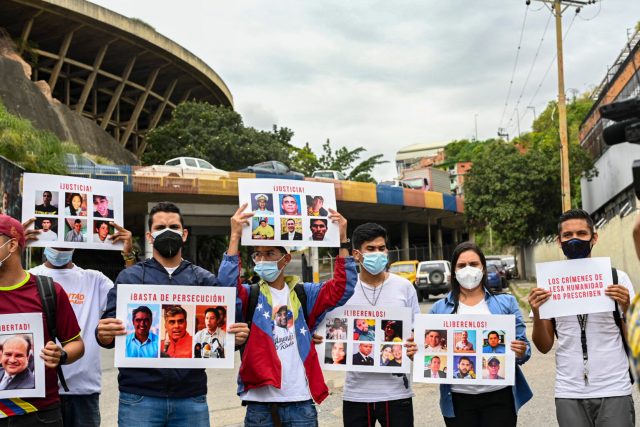
In its Annual Report 2022, the Inter-American Commission on Human Rights (IACHR) of the Organization of American States indicated that Cuba, Nicaragua, and Venezuela closed the year with 1,476 people, including service members and civilians, imprisoned for political reasons.
By Dialogo Américas – Julieta Pelcastre
Feb 7, 2023
“This leaves an extremely weakened social system,” Daniel Varnagy, a political science scholar at Venezuela’s Simón Bolívar University, told Diálogo on January 16. “These societies are left lowering their human needs little by little and what they seek is to survive economically, socially, and politically.”
The IACHR described the regimes of these three nations as “instrumentalizing the judiciary to persecute, detain, and imprison” citizens with political and ideological differences from the dictatorships.
“The independence and autonomy of the judiciary is an essential element for the existence of the rule of law, and a basic precept to ensure the exercise of rights to due process and access to justice,” the IACHR said.
The report noted that Cuba is the nation with the most political prisoners, with 1,034 citizens detained as of November 2022. In Venezuela there were 247 prisoners as of October, while in Nicaragua there were 195 detainees as of December.
Subhuman conditions
The IACHR report highlighted the “deplorable conditions” to which citizens deprived of their freedom for political reasons are subjected, “which causes serious deterioration of health in most of them and affects their life and personal integrity.”
They do not have access to drinking water or regular and adequate food, nor contact with their families. They are subjected to cruel treatment and torture, and their hours of daylight are restricted, the report said. There is also a lack of official information about the detainees’ situation. They are held incommunicado and do not receive medical care, the report said.
Cuba, a prison
The Cuban government represses and punishes any kind of non-conformity and public criticism. The security forces do not present court orders to justify the detention of their critics. Agents prevent people from attending protests by arresting demonstrators and journalists or prohibiting them from leaving their homes, international organization Human Rights Watch (HRW) said in a late 2022 report.
“Cuba has become a huge prison for its citizens,” said Prisoners Defenders, a Spanish human rights nongovernmental organization (NGO). Countless minors have been detained and sentenced to harsh penalties for exercising their freedom of demonstration and association, the NGO added.
The Cuban regime has four axes of power and subjugation on which the Cuban totalitarian system has relied for 63 years for its survival: ideology and propaganda, international diplomatic relations, illegal state revenues, and repressive-military capability, says Prisoners Defenders.
In December, the U.S. government once again called for the release of hundreds of political prisoners in Cuba, U.S. President Joe Biden said in a statement. “There is a lot of weariness among Cubans; there are already many years of repression,” Varnagy added.
More repression in Nicaragua
The HRW report emphasizes that in Nicaragua the Ortega-Murillo regime is deepening systematic repression against critics, journalists, and human rights defenders. The Catholic Church, centers of higher education, and NGOs are constant targets of the regime.
At least 50 public figures, including seven presidential candidates, received prison sentences of up to 13 years and disqualification from holding public office, the HRW report indicated. The criminal proceedings against the detainees were based on absurd charges.
On January 10, the Inter-American Court of Human Rights ordered protection measures and the release of 11 opponents of the Nicaraguan regime, whose health had seriously deteriorated. The protection measures extend to prisoners’ family members.
Against the Venezuelan regime
In Venezuela, judicial authorities are participants or accomplices to abuses, serving as a repression mechanism, HRW said. some 875 of the 15,770 civilians who were arbitrarily detained between 2014 and June 2022 were prosecuted in military courts.
According to HRW, security forces and paramilitary groups, known as “Colectivos,” that support the Nicolás Maduro regime have attacked protesters repeatedly since 2014, including raids, brutal beatings, and shootings at very close range.
“Venezuelans are talking quietly about the upcoming primary elections in 2023,” Varnagy said. “Perhaps the population will rally to demonstrate […] to confront the ruling party in the elections, so that all is not lost.”
Call for freedom
The IACHR urges Cuba, Nicaragua, and Venezuela to release all political prisoners, and to respect and guarantee the life and integrity of individuals. It encourages them to take humanitarian actions to improve the conditions of the detainees, and to allow them visits from lawyers and family members.
In addition, it urges these three dictatorships to respect the right to counsel and due process of law, to conduct trials within a reasonable time with guarantees of independence and impartiality, as established by international law.
“These leftist authoritarian systems will eventually crack […], but this deterioration can last for decades,” Varnagy concluded. “In the meantime, citizen education must be strengthened to prepare society to demand accountability from their leaders.”
…
Read More: Dialogo Américas – The Political Prisoners of Cuba, Nicaragua, and Venezuela
…

